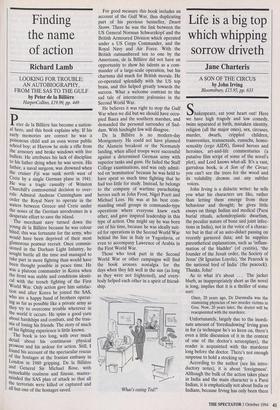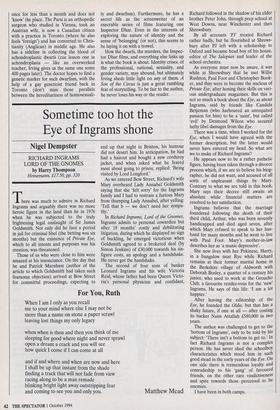Life is a big top which whipping sorrow driveth
Jane Charteris
A SON OF THE CIRCUS by John Irving Bloomsbury, £15.95, pp. 633 Shakespeare, eat your heart out! Here we have high tragedy and low comedy, twins separated at birth, mistaken identity, religion (all the major ones), sex, circuses, murder, dwarfs, crippled children, transvestites, transsexuals, eunuchs, homo- sexuality (ergo AIDS), flawed heroes and heroines, art-and-life commentaries (a putative film script of some of the novel's plot), and Lord knows what-all. It's a vast, garrulous book, is A Son of the Circus; you can't see the trees for the wood and its volubility drowns out any subtler voices.
John Irving is a didactic writer: he tells you what his characters are like, rather than letting them emerge from their behaviour and thought; he gives little essays on things Indian and medical (Parsi burial rituals, achondroplastic dwarfism, the peculiar nature of bone and joint infec- tions in India), not in the voice of a charac- ter but in that of an auto-didact passing on recently garnered data; and he supplies parenthetical explanations, such as 'inflam- mation of the bladder' (of cystitis), 'the founder of the Jesuit order, the Society of Jesus' (St Ignatius Loyola), 'the Peacock is the national bird of India' (the peacock). Thanks, John!
As to what it's about . . . The jacket blurb, as inappropriately short as the novel is long, implies that it is a thriller of some sort:
Once, 20 years ago, Dr Daruwalla was the examining physician of two murder victims in Goa. Now, 20 years later, the doctor will be reacquainted with the murderer.
Unfortunately, largely due to the inordi- nate amount of 'foreshadowing' Irving goes in for (a technique he's so keen on, there's even a little discussion of it in the context of one of the doctor's screenplays), the reader is acquainted with the murderer long before the doctor. There's not enough suspense to hold a stocking up. According to the author (see his intro- ductory notes), it is about 'foreignness'. Although the bulk of the action takes place in India and the main character is a Parsi Indian, it is emphatically not about India or Indians, because Irving has only been there once for less than a month and does not `know' the place. The Parsi is an orthopedic surgeon who studied in Vienna, took an Austrian wife, is now a Canadian citizen with a practice in Toronto (where he also feels 'foreign') and has converted to Chris- tianity (Anglican) in middle age. He also has a sideline in collecting the blood of achondroplastic dwarfs (cue lesson one in achondroplasia — like an overworked teacher, Irving gives us the same one some 400 pages later). The doctor hopes to find a genetic marker for such dwarfism, with the help of a gay geneticist friend back in Toronto (don't miss those parallels between the hereditariness of homosexuali- ty and dwarfism). Furthermore, he has a secret life as the screenwriter of an execrable series of films featuring one Inspector Dhar. Even in the interests of exploring the nature of identity and the sense of 'belonging' (or not), this seems to be laying it on with a trowel.
How the dwarfs, the murders, the Inspec- tor Dhar films, and everything else links up is what the book is about. Identity crises, of the professional, national, sexuality, and gender variety, may abound, but ultimately Irving sheds little light on any of them. A Son of the Circus is just a great rambling feat of storytelling. To be fair to the author, he never loses his way or the reader.



























































 Previous page
Previous page